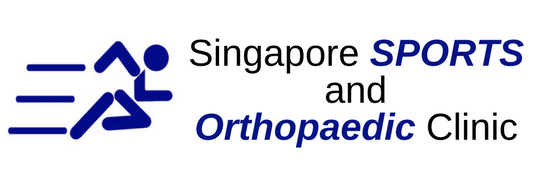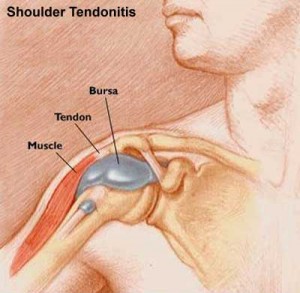What is Shoulder Tendonitis?
Shoulder tendonitis is the inflammation, irritation and swelling of the tendons in the rotator cuff and bicep. Shoulder tendonitis is usually caused by the pinching of the nerve in the shoulder or from repetitive strain (RS) on the shoulder joint.
This particular type of tendonitis is common amongst sports and activities that require the hand to be moved above the head. These activities include weight llifting and bodybuilding, swimming, rock climbing, swimming and baseball.
Shoulder tendonitis often starts as just a slight pain in the shoulder or upper bicep but can develop into a pain that will encompass the entire shoulder/upper arm area. It’s a condition that can be easily treated but in serious cases may become permanent.
Symptoms of Shoulder Tendonitis
Early signs of shoulder tendonitis include a slight pain in the shoulder/upper bicep area when you move your arm up and down. This pain may only occur when the shoulder is under pressure but may still occur at anytime of the day or night.
As the tendonits develops the pain will get more severe and spread from the area where the shoulder meets the arm to all over the rotator cuff. The shoulder will often feel tender and in more severe cases some swelling may be experienced. It’s always best to consult your GP to correctly diagnose shoulder tendonitis.
How is Shoulder Tendonitis Diagnose?
If you think you may have shoulder tendonitis you should stop doing any activities that may stress the shoulder and see your local doctor. Your doctor will ask you for your complete medical history and give you a full body physical examination. If required x-rays may be taken of the affected area.
Treatment for Shoulder Tendonitis
The treatment that you may recieve for shoulder tendonitis will depend on a variety of factors. These may include:
- Your age and physical condition
- How advanced the tendonitis is
- Your tolerance to medications
- How well you need it to heal (for professional sports people)
- Your treatment preference
Depending on the conditions mentioned above, some of the following treatment methods may be used. Now, these are in order from light tendonitis to very severe tendonitis.
- Rest of the affected shoulder
- Over the counter anti-inflammatory medications
- Ice and light massage
- Shoulder strength training (with very light weights)
- Ultrasound therapy
- Steriod injections (used rarely)
- Shoulder surgery
Your doctor may decide to use one or more of these treatments depending on the factors mentioned above. In most cases shoulder tendonitis can be effectively diagnosed and treated without the need for medication or surgery.
The key to treating your shoulder tendonitis is rest. As soon as you feel tendonitis symptoms you should stop the activity and rest your shoulder for at least three weeks. You can find more information on out tendonitis treatment page.






